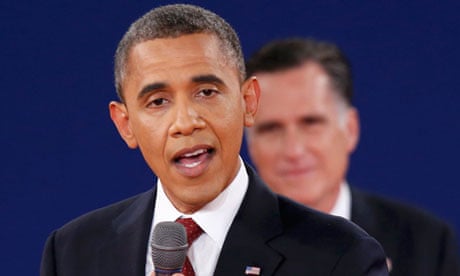President Obama brought his A-game to the debate Tuesday evening. After demurring in the first presidential debate, this Obama was hardhitting and unwilling to cede ground to Mitt Romney. There were many exciting moments, but will any of them move the polls?
An immediate look at the post-debate "insta" snapshots suggest that a gain for the president is possible. The CBS/Knowledge Networks poll of undecided voters had Obama winning the debate 37% to 30%. A Public Policy Polling survey of debate watchers in the swing state of Colorado gave Obama a 48% to 44% edge. A CNN/ORC nationwide poll of debate watchers pegged Obama the winner 46% to 39%.
These wins are solid, especially considering that debate watchers tend to be a few more points Republican. They suggest that, if nothing else, it's unlikely that Obama will lose ground. The question as to whether he will gain any is more in doubt.
First, it's important to remember that a lot of the movement after the debates is about the media spin. There can be little doubt when watching, listening to and reading the media that they are ready to declare that Obama was back in style. The issue is that many sources also seemed to suggest that, in the words of NBC's Chuck Todd, "Romney seemed to be ready for it." That would seem to suggest more of a tie than anything else.
The question over whether this narrative becomes a solid Obama victory will likely revolve around video playback of the many confrontations between the candidates. One, in particular, stood out – regarding Libya and whether the terrorist attacks on the US consul to Libya and others in Benghazi were or were not called a terrorist act by President Obama. It was a crucial moment in the debate and Obama claimed that he'd said on 12 September that it was a terrorist attack, while Romney disagreed. Moderator Candy Crowley, acting as impromptu fact-checker, mostly sided with Obama. The showdown left a "mark" on Romney, said Todd.
The whole truth is fuzzier than the debate let on. In his 12cSeptember remarks in the Rose Garden, Obama did use the word "terror", but he didn't refer specifically to the events in Benghazi when using the word. This has become a focal point in a lot of post-debate discussion – and Republicans have fought back hard. How the media handles this Libya question and the American people's response could be key in determining "who won" the debate as a whole.
Second, Obama's victory this time around doesn't match the scale of Romney's from the first debate in the polls. Romney won that debate by a recording-breaking 42 points in the CNN poll and took undecideds by 24 points in the CBS survey. We also know that respondents in the CNN poll – by an 18 percentage point margin – were more likely to say they would vote for Romney over Obama thanks to the first debate, compared to a tie on this question after the second debate.
And despite these massive wins, Romney picked up a comparatively small 4 points nationally. We can therefore try to determine how a smaller Obama win in the second debate insta-polls might predict how much ground he will gain. The ratio of winning the debate and picking up national support from the first debate was along the lines of 10.5 (a 42-point debate victory margin over a 4-point ultimate gain) in the CNN poll, and 6 (a 24-point debate victory margin over a 4-point ultimate gain) in the CBS poll.
If these ratios hold for the second debate and given Obama's insta-poll margins, then Obama should gain, maybe, a single point nationally. This is not rigorous exercise, but suggests that Obama doesn't stand to gain too much ground.
Third, it's unlikely that this debate will deflate Republican enthusiasm. Perhaps the biggest gains for Romney after the first debate came because he was able to take an already wide likely/registered voter gap and expand it just a bit. There's nothing in the data to suggest that Republicans were deflated by this performance. They are, for instance, standing strong with Romney on the Benghazi attacks, which tends to support the idea that Romney didn't do poorly so much as Obama did well.
Fourth, Democratic enthusiasm will hold thanks to this debate, yet it likely never dropped. If you had any Democratic friends, you probably saw a few who held their heads low after the first debate. You probably saw more hardcore Democrats, however, who offered an impassioned defense of the president. The polls reflect that. After the first debate, Public Policy Polling surveyed Virginia and Wisconsin voters and found that Democratic enthusiasm was stable compared to pre-debate. I guess it's possible that Democrats are more enthusiastic than ever, thanks to this debate, but I think the post-convention/pre-debate Democratic enthusiasm is as high as it's going to get. That means the registered/likely voter gap will remain.
Fifth, Romney must remain favorable to the American public and probably will. Before the first debate, Romney was seen unfavorably by much of the American public. That changed dramatically thanks to the first showdown. Obama, on the other hand, has had his favorable ratings stay relatively consistent for months. This suggests that Romney's gains were due to perceptions of Romney, less than they were due to Obama's performance.
If that hypothesis is correct, then Obama probably can't gain back voters with a good performance. Romney can only lose them with a bad one. There's not a lot in the numbers to suggest he did.
So, I'm not expecting much, if any, movement from this debate. If it does occur, it will be favorable towards President Obama. He'll take that, in this tight race, as every little bit counts. But remember that predictions about post-debate movements are not perfect and that any movements or lack thereof could be erased by next week's debate.








